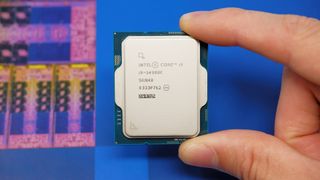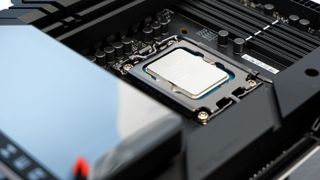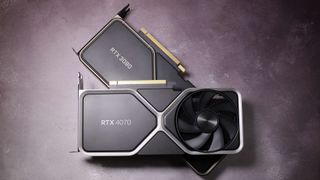There are increased reports of crashing in Unreal Engine games, etc. and Epic is blaming Intel chips
Power-hungry, high-clocked CPUs can be a tad unstable if they're not given the right BIOS settings.

A division of Epic Games is pointing the finger at Intel's latest CPUs when it comes to an increasing number of reported Unreal Engine game crashes. Modern top-end CPUs are jammed full of cores, all running at high speeds, and it takes a lot of energy to keep them running like this. That's particularly true for Intel's most recent Core i9 processors, which are some of the most power-hungry chips around. And to eke out even more performance, motherboard vendors often use BIOS settings that push things even further.
All of this seems to be the culprit in the increased reports of game and app crashes, especially those that are built in Unreal Engine, and the only solution is to delve into those settings to calm the beast down a notch.
That's according to RAD, a division of Epic Games, which develops the Bink video codec and Oodle data compression tech used in hundreds of games on the market. It points the finger directly at Intel, too: "We believe that this is a hardware problem which affects primarily Intel 13900K and 14900K processors, less likely 13700, 14700 and other related processors as well."
The software team states that the problems have nothing to do with any code in its products or Unreal, and notes that other software, such as CineBench, Handbrake, and Visual Studio also exhibit the same issue.
If your gaming PC has crashed, giving an 'out of video memory' GPU message, and the system sports a Core i9 13th or 14th Gen processor, such as the Core i9 14900K, then the problem is possibly being caused by the CPU (despite the nature of the error). Certain i7 models, typically the unlocked K-versions, are also reportedly experiencing the problem, though to a lesser extent.
Because this isn't a software issue, your only course of action is to delve into the CPU's settings, either in the motherboard BIOS or by using Intel's Extreme Tuning Utility (XTU). One simple fix that may work is reducing the clock multiplier for the P-cores down a notch or two. For example, if the default value is x55, then dropping it to x54 or x53 may well stop the crashes from occurring.

The easiest way to do this is via XTU, though you may have to reapply the setting every time you boot your computer. A permanent way of applying it is in the BIOS, though you'll have to delve through the vendor's manual to find out exactly where to do this.
The biggest gaming news, reviews and hardware deals
Keep up to date with the most important stories and the best deals, as picked by the PC Gamer team.
While you're there, you may also want to tweak a few other values. I have an Asus motherboard in my PC and it has one specific setting labeled 'ASUS MultiCore Enhancement.' This forces the CPU to operate a little faster than Intel's default values but it also makes the CPU consume more energy. Disabling it lowers performance a touch, though you will gain more stability.
The same is true for the 'long/short duration power limits' which are also known as PL1/PL2 values. The Core i9 14900K, for example, has default limits of 125W and 253W but your motherboard could be forcing them to be higher (which is what Asus is doing with its own 'enhancements'), so the CPU can maintain a higher clock speed, when under load.
Shader compilation in Unreal Engine games and video decompression can put CPU cores under sudden, and sometimes sustained, loads so if the power limits are too high, then the processor could be fighting to remain stable.

Best CPU for gaming: The top chips from Intel and AMD.
Best gaming motherboard: The right boards.
Best graphics card: Your perfect pixel-pusher awaits.
Best SSD for gaming: Get into the game ahead of the rest.
Not every Core i9 user will be experiencing these crashes, even if they have, say, an Asus motherboard with multicore enhancement enabled. Given that it's a relatively small number of people reporting the issues, this may be a case of such CPUs being those that only just pass the tests performed during manufacturing that determine what processor model a chip will be used for.
If you went out and bought 80 samples of processor models, you'd find that there would be a notable difference between what clock speeds they can reach, how much power they consume, and how hot they become under load. In other words, if you're one of the people experiencing these crashes, you've just been unlucky.
At least it's easy enough to make one's PC stable, but if you think that you shouldn't have to mess about in the BIOS because you've paid for a product that's supposed to work just fine, you could always request an RMA and hope that you get one of the better quality chips.

Nick, gaming, and computers all first met in 1981, with the love affair starting on a Sinclair ZX81 in kit form and a book on ZX Basic. He ended up becoming a physics and IT teacher, but by the late 1990s decided it was time to cut his teeth writing for a long defunct UK tech site. He went on to do the same at Madonion, helping to write the help files for 3DMark and PCMark. After a short stint working at Beyond3D.com, Nick joined Futuremark (MadOnion rebranded) full-time, as editor-in-chief for its gaming and hardware section, YouGamers. After the site shutdown, he became an engineering and computing lecturer for many years, but missed the writing bug. Cue four years at TechSpot.com and over 100 long articles on anything and everything. He freely admits to being far too obsessed with GPUs and open world grindy RPGs, but who isn't these days?
Most Popular





